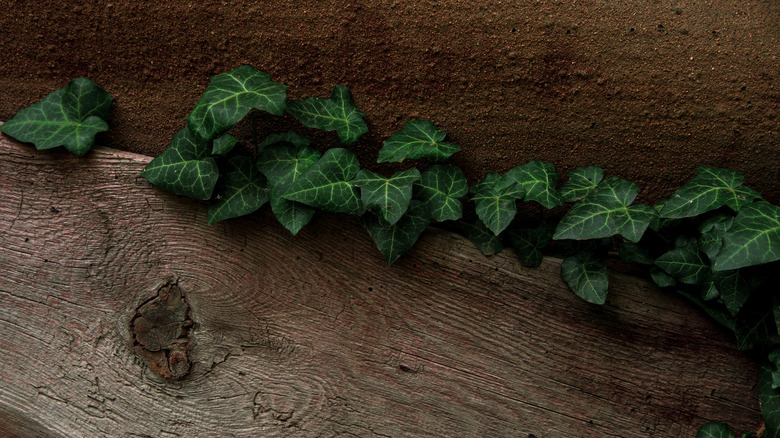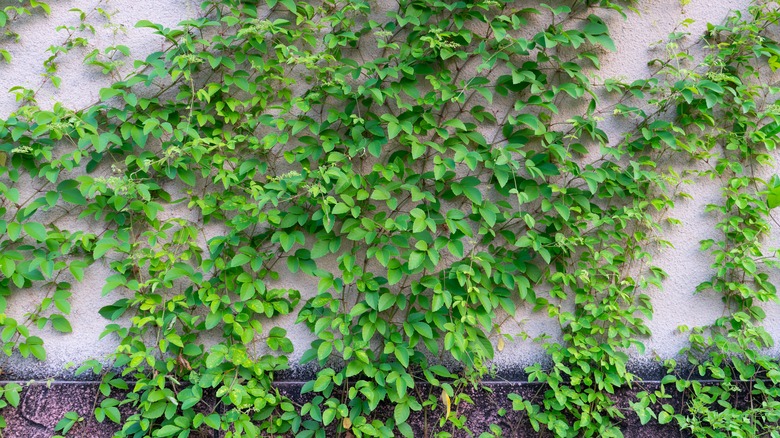Garden Trees, Shrubs & Vines
Sandy Baker
Are the neighbor’s vines coming over the top of your fence or climbing into your flowerbed? Know your legal rights before you take care of their vines on your property. This is a common problem associated with fences since vines like to latch on and spread. If the fence, retaining wall, or other structure is yours, you may think the easy solution is just to remove the vines yourself. Don’t do that just yet — if you’ve built the fence on the property line, your neighbor has rights to what happens on their side of the structure. If they decide to plant flowers, trees, shrubs, or other items on their side of the fence, but they grow over and onto your fence and your property line, you may be able to remove them.
Before taking action, learn what the property rights are within your state and your local area. Many communities have very specific rules about property line encroachment and how much you can trim or remove anything hanging over into your space. The following are some guidelines to help you navigate the system. However, be warned that laws differ so much that it’s worth calling your local auditor’s office to get clarification about property lines in your neighborhood. Not all relationships with neighbors are positive, but knowing your rights within the law can help you protect your fence from overgrown, potentially damaging vines.
Navigating cutting back vines

Yurii Sliusar/Getty Images
Vines, tree branches, or other vegetation growing on your fence that started on your neighbor’s property could be removed in some cases. Typically, laws allow property owners to remove anything that extends over the property line. For example, if the vines start on their shrub and then encroach and grow onto your fence, and that fence is both owned by you and fully on your property, you can remove the portion on your fence. However, you cannot go onto your neighbor’s property to do so. You cannot damage their plant’s roots either. All you can do is remove what’s on the fence.
What makes this more complicated, though, is what happens when the structure is on the property line. If you do not fully own the structure the vine is growing on because it is on the property line (in some states, that means it’s jointly owned), you can only remove what’s over the property line. In many states, the property line extends upwards, but this doesn’t give you the right to remove anything in their property. You can have a formal survey of the property completed by a surveyor, which involves locating pins in the ground at the property lines. This can then be used as grounds to support your legal right to remove the vines. When two neighbors own a fence jointly, they must agree on what occurs, or the court will need to make a final decision.
How to stop vines from growing onto your structure

Jaran-Lao/Shutterstock
If vines are growing from your neighbor’s yard into yours, with no structure — just growing along the ground — you can remove what’s over the property line. However, if it’s growing on a retaining wall, fence, or another structure, you can do a few things to navigate the problem. You may be able to reach out to the homeowner’s association (HOA) to discuss what’s occurring, such as noting the problem of the vines causing decay to your wooden fence. If you’re not in an HOA, you may be able to reach out to your local councilperson to request some assistance in learning your rights. If you’re still thinking about removing the vines from a fence you’re not sure you own, keep in mind you could pay fines, and in some states, you may also face criminal charges.
Replacing your existing fence with one less likely to allow vines to spread, such as a plastic or vinyl product, instead of a chain-link fence, could be more elaborate and expensive. However, if you do this work, check with city building codes that may limit your ability to install a new fence close to the property line. If all else fails, before you remove the vines from the fence, contact your local government or even an attorney to gain clarity. The city can require a neighbor to allow you to make changes when the law allows.



